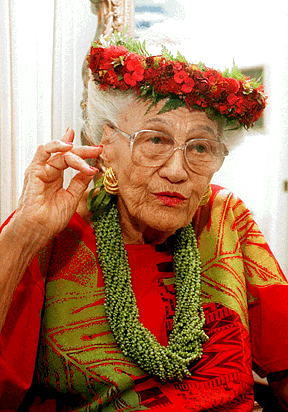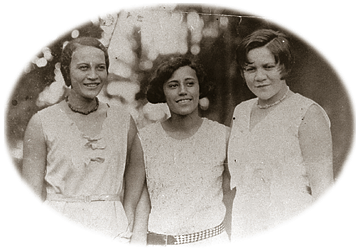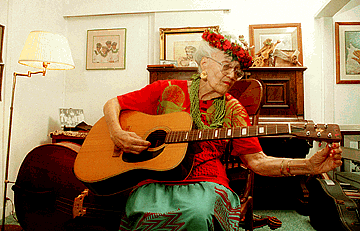
Saturday's honoree, Irmgard Aluli.
Photos by Craig T. Kojima, Star-Bulletin

Saturday's honoree, Irmgard Aluli.
Photos by Craig T. Kojima, Star-Bulletin
Aluli has no idea how many songs she's composed. They're piled neatly in her giant living room cabinet of many drawers, and she gestures at the imposing tower of compositions and says she's "going to straighten it all out someday."
Her songs include classics such as "Puamana," "Boy From Lapahoehoe," "Lu'au Feet," "Baby Has Big Lu'au" and "E Maliu Mai," and Hawaiian music historian George Kanahele ranks her as the most important female composer since Queen Lili'uokalani.

From left, Irmgard Farden, Annie Kerr and Diane Farden
formed the Annie Kerr Trio.
"We were a large family - 12 of us kids survived," Aluli said. "My father (Charles Kekua Farden) worked at the plantation and all the kids played instruments. Pianola, saxophone, violin, everything. Not just Hawaiian tunes, but classical music as well."
Brother Carl became an opera singer and introduced Lahaina to opera. It might have been the only musical form not played in that plantation community.
"All the ethnic groups sang and danced and performed. Particularly at Christmas, there would be big pageant and everyone performed," Aluli recalled. "I heard Japanese music and Filipino music, and Hawaiian, and we lived for issues of Etude magazine, which had the latest songs transcribed in it; we bought the Gold Seal classical records so we could listen to Caruso ... we had everything!"
Her father encouraged music but discouraged hula.
"It was his missionary training. We could speak the Hawaiian language, and sing in it, but couldn't dance to it. It was interesting to hear God's music sung in those days in Hawaiian choirs, because they had a lot of alto and bass voices. You don't hear that in choirs anymore."
Sister Emma Farden rebelled and became a kumu hula, eventually teaching thousands of children the Hawaiian dance form on Maui. The family was close, however, and they spent their free time performing together. They improvised harmony during moonlit walks on the beach, following the soft susuration of the surf as a metronome.
As a teen-ager, Irmgard Farden was packed off to boarding school at St. Andrew's Priory in 1925. "We were only allowed out once a month, and all the boys were at Iolani. I don't think we ever did any mixing with the boys - we girls had to play music and dance with each other."
That one day ran from 8 a.m. to 8 p.m. on the first Saturday of the month, and what a day it was!
"My married sister felt responsible, so I'd go over to her house on Saturday morning and do housework and laundry. Then we'd go to a matinee at the Princess or the Hawaii Theater. Oh! I loved that!" Aluli exclaims, her already bright eyes becoming luminous at the memory.
"All of the high school kids would be there. The theater would throw a song on the screen and we'd sing along with the bouncing ball. Everyone in the theater would be singing - loved that. It was the nicest feeling a girl could have."
After the movie, a Chinese dinner with the family, then a drive around, maybe a stop for a bag of peanuts and then back to Priory. Her only regret about the cloistered life was that "I didn't get to know Honolulu. I'm the type who likes to snoop."

Aunty Irmgard relaxes at home.
During summers, the Fardens regrouped in Lahaina and began a regular series of productions in the local dance hall.
"We did everything: Hawaiian, Tin Pan Alley, Negro spirituals. I even took a course in 'Fancy Dancing' and learned high kicking!" Aluli said.
A formal musical education didn't seem necessary - it would have been like taking classes in learning how to breathe. By this time she was performing regularly with the Annie Kerr Trio, which also included sister Diane, and occasionally with brother Carl in the Farden-Poepoe 11-piece orchestra.
"I was never sorry I majored in home economics, because I learned good nutrition," Aluli said. "I knew I was going to be a teacher, but after I graduated, I found I didn't like it much."
Luckily, a rural revolution was sweeping the islands. The poi food staple was being replaced by rice, which was causing havoc in balanced diets. Aluli's background in nutrition and neighbor-island lifestyles made her an ideal extension-service instructor, and she traveled to teach country women new nutrition information and, in the process, play music.
Living in deep-country Molokai in 1935, lonely and advising the local Girl Scout troop on a musical production, Aluli wrote her first song, "Down on Maunakea Street."
Other songs tumbled out of her in the late 1930s, including the hit "Puamana." She continued to perform - the Annie Kerr Trio became the Annie Kerr Girls when the lineup grew - and met a legal student at the university, Nane Aluli.
They were married on the last day of 1941, weeks after the Pearl Harbor attack, during a time of fear and uncertainty, in a simple ceremony in daytime because of blackout restrictions.
The simple life of the rural nutrition teacher with the songwriting ability changed, but that was all in the future. She became Irmgard Aluli, an inspiration to kids with big dreams, but deep inside, where the music comes from, she's still Irmgard Farden, the little girl who learned to sing harmony on a moonswept beach.
What: Prince Lot Hula Festival, the only noncompetitive hula festival in the state, this year honors Irmgard Aluli, 85, one of the most respected figures in Hawaiian music. Features 14 halau hula from around the state
When: 9:15 a.m. Saturday
Where: Moanalua Gardens
Cost: Free
Call: 839-5334